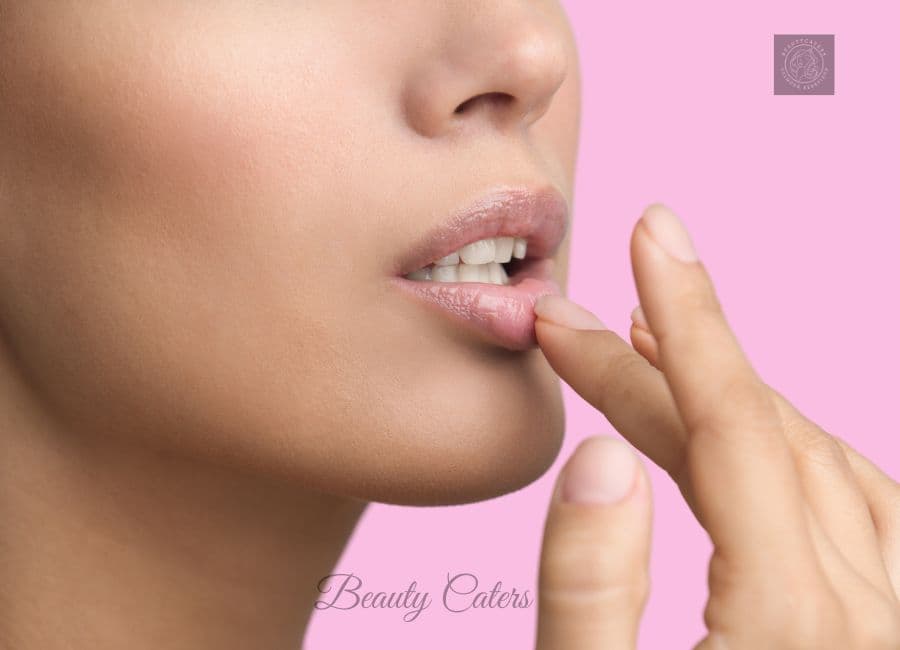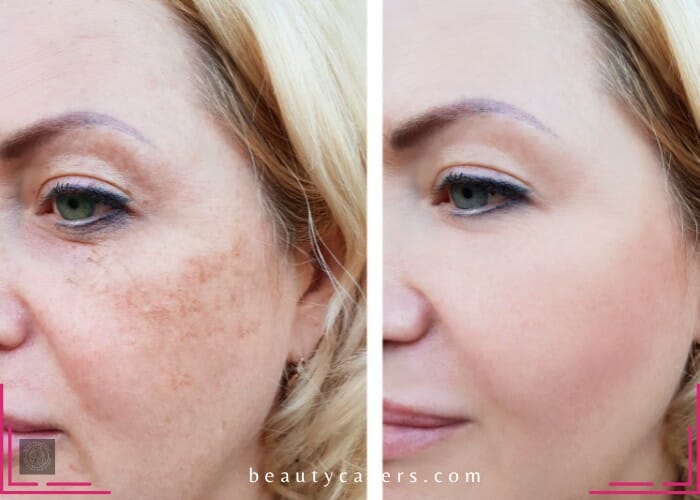Is Vitamin C Good for Acne Prone Skin? (Know the Facts)
At BeautyCaters, our expert team independently curates every recommended product. Purchases through our links may earn us a commission. Explore our transparent selection process.
Many people asked me “is vitamin C good for acne prone skin”?
Acne can be an uncomfortable and embarrassing skin condition, but there is hope for those struggling with breakouts. Vitamin C has long been recognized as an essential nutrient for overall health, and it can also be beneficial for acne-prone skin.
In this article, we’ll explore the benefits of Vitamin C for acne-prone skin and other types of skin as well.
Table of Contents
Vitamin C for skin why is it so important
Topical vitamin C is a very popular ingredient in the skincare world due to its ability to stimulate collagen synthesis, reduce the appearance of blemishes and prevent sun damage.
It is an antioxidant capable of combating the appearance of free radicals, harmful molecules that are generated by exposure to ultraviolet rays, pollution or metabolic processes.
There are many derivatives of this vitamin, but we recommend that you look for ascorbic acid, the pure and effective form of this active ingredient, in the formula of your vitamin C serums.
We’re going to explain everything you need to know about vitamin C: what it is, what its benefits are for your skin, what types exist, how best to introduce it into your routine and how to find a product containing this ingredient. Let’s get started!
Related: Best vitamin C serum in India
What is acne?
Acne is one of the most common skin conditions that affect people of all ages. It is characterized by red, inflamed pimples, blackheads, and whiteheads that can appear on the face, neck, chest, back, shoulders, and other areas of the body.
Acne is not only a physical issue, but it can also cause emotional distress and can lead to lower self-confidence. In this blog, we will explore the different causes and treatments of acne, as well as how to properly manage the condition.
What is vitamin C?
Vitamin C is an antioxidant essential for the functioning of the human body. We get it through the consumption of certain fruits and vegetables and it has the function of helping to generate and repair our tissues.
It has numerous benefits when applied topically due to its antioxidant action, which is why it is a widely used ingredient in skin care products such as moisturizers and serums. Its ability to fight free radicals that are generated when our skin comes into contact with pollution, solar radiation or other external agents can prevent damage to skin cells.
There are many myths about vitamin C that you should know.
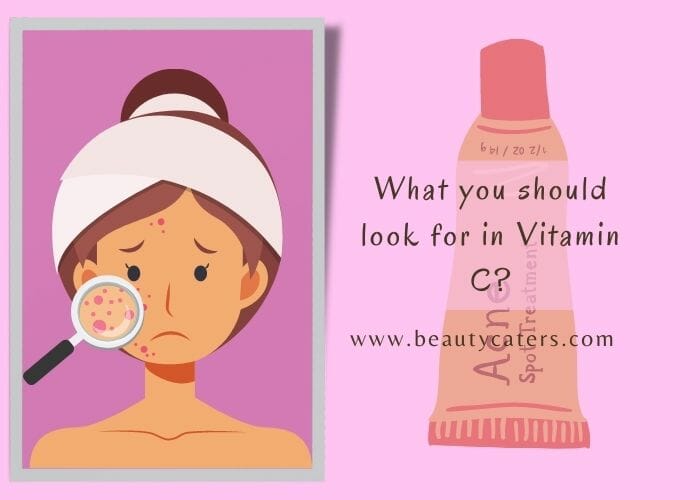
Why is vitamin C important for the skin?
Using a product with vitamin C helps to improve the signs of premature skin aging, such as wrinkles or fine lines, dark circles under the eyes, fade the appearance of dark spots, diminish sun damage and improve acne.
In our skincare products we can find vitamin C in its purest form, ascorbic acid or L-ascorbic acid, with high bioavailability (meaning the body can use it immediately) but low stability. This is, for the moment, the most effective option with the most scientific evidence.
Laboratories have managed to develop more stable forms of vitamin C, such as ascorbyl glucoside, ascorbyl palmitate, retinyl ascorbate, or tetrahexyldecyl ascorbate, an interesting and promising derivative.
Vitamin C derivatives are converted to pure vitamin C when they come into contact with the skin, and are usually more stable due to the combination with other ingredients. Even so, the total percentage of this vitamin C that we are applying with its derivative forms is usually lower than what we obtain with its purer form.
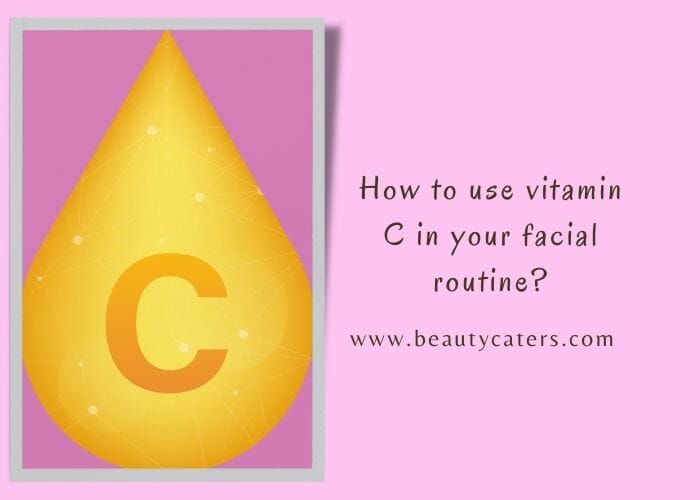
Benefits of vitamin C
The main benefits of vitamin C when applied correctly to the skin are the following:
- Stimulates the production of collagen and elastin: collagen is a protein that gives structure to the skin. It is abundant when we are young, but as we get older it degrades and its synthesis slows down. Applying a vitamin C product to the skin stimulates the production of these structural proteins, thanks to its antioxidant action and acidity. According to this study [1], a daily application of vitamin C for three months improved the appearance of fine lines, wrinkles and decreased skin flaccidity. It also helps to heal wounds.
- Protects cells from oxidative stress: as a potent antioxidant, when applied to the skin it helps eliminate free radicals created by exposure to ultraviolet rays and other environmental aggressors, such as pollution. Free radicals are harmful molecules that over time cause skin sagging and the appearance of wrinkles and blemishes. Its antioxidant action is even more powerful when combined with ferulic acid or vitamin E.
- Lightens skin blemishes: this vitamin has a very interesting property for skin with hyperpigmentation, the inhibition of melanin production in the cells. It is common in depigmenting serum formulas thanks to its effectiveness in lightening brown spots on the skin induced by sun exposure, according to the results of a study [2].
- Improves acne lesions: some clinical studies suggest that topical vitamin C can improve acne lesions with little irritation or side effects.
Types of vitamin C
These are some of the most commonly used types of vitamin C in skin care product formulations. We can divide them between the active form and the inactive forms of vitamin C.
This is the active form:
1 Ascorbic acid.
Ascorbic acid or L-ascorbic acid is the most efficient and effective active form of vitamin C known to date. It is water soluble and begins to act immediately upon application. It has greater scientific evidence to support its efficacy than other forms of vitamin C derivatives.
It can be said that it is the “mother” of all other vitamin C derivatives, because they need some processes to end up becoming active vitamin C. Its effectiveness is higher in concentrations between 8% and 20%.
This ingredient has the disadvantage that it is very unstable: this means that it degrades easily. Therefore, it is difficult to formulate it and laboratories invest a lot of time and resources in doing so. This is the reason why products containing the purest form of this vitamin are usually more expensive than the rest.
The other forms of vitamin C are inactive: this means that they are activated when applied to the skin, but they are more stable.
2. Sodium ascorbyl phosphate (SAP)
Sodium ascorbyl phosphate or sodium ascorbyl phosphate has been shown to have the benefits of ascorbic acid, plus some potential to inhibit acne-causing bacteria. It may be of interest for oily skin.
3. Tetrahexyldecyl ascorbate (THD)
Tetrahexyldecyl ascorbate (THD) is one of the most promising vitamin C derivatives available to date. It has the same potential benefits as ascorbic acid, although it is oil soluble. It works great in combination with other antioxidants, such as licorice root or niacinamide.
4. Magnesium Ascorbyl Phosphate
Magnesium ascorbyl phosphate, or magnesium ascorbyl phosphate, is one of the most stable derivatives of pure vitamin C. It is not as high in antioxidant function, but it does have some depigmenting power. Its antioxidant function is not as high, but it does have some depigmenting power. It does not absorb too well into the skin, so it is suitable for sensitive skin.
5. Ascorbyl glucoside
This form of vitamin C or ascorbyl glucoside can improve signs of aging, hyperpigmentation and brighten the skin. Still, it is not the best option to use if you are looking for a very effective product.

How vitamin C works
Antioxidant function
Environmental factors, such as solar radiation, pollution and tobacco use, can accelerate skin damage through the formation of free radicals. Vitamin C neutralizes oxidative stress and reduces the formation of free radicals generated after sun exposure by up to 50% when used in conjunction with a broad-spectrum sunscreen.
Depigmenting function
Vitamin C inhibits the melanin formation mechanism that takes place in the cells, thus reducing the appearance of brown spots caused by sun or hormonal causes.
What to look for in a vitamin C product
To introduce vitamin C into your routine and get the most out of its benefits, you should consider the following:
- Better if it is in the form of a serum: we can find vitamin C in multiple skin care products, but the most effective way to use it is through a serum. This type of product usually offers the highest concentrations of this active ingredient in combination with ingredients that enhance its antioxidant function.
- Look for serums with vitamin C in its pure form: pure vitamin C, ascorbic acid or L-ascorbic acid, is the most effective form of vitamin C, as it acts immediately on the skin. The best serums with active vitamin C usually incorporate this form in their formulas in concentrations of 12% or more. The problem with using more stable derivatives of this vitamin is that they are not as well studied and do not seem to be as effective (in general, although there are beginning to be exceptions).
- It should have a concentration of between 10% and 20%: this concentration of pure vitamin C is the one that has been studied and provides greater benefits to the skin. In case of derivatives, keep in mind that the amount of active vitamin C reaching the skin will always be lower.
- Works best in combination with other antioxidants: some studies [3] show that the efficacy of vitamin C is greater when combined with other antioxidants, such as ferulic acid, vitamin E or niacinamide. Together they work through different mechanisms to fight free radicals.
- Check that the packaging is dark: vitamin C has a high instability. That means it oxidizes easily, losing properties quickly when it comes into contact with air or light. That is why the packaging of products containing this ingredient is usually opaque or very dark. Even so, it is curious that some brands continue to produce vitamin C serums with transparent packaging or in dropper format.
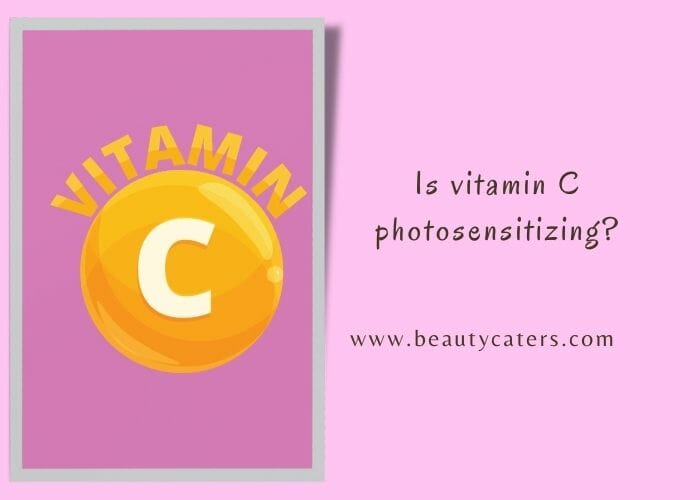
How to use vitamin C in your facial routine
The best way to use vitamin C in a facial routine is to introduce it in the morning, along with the rest of the antioxidants. This way, its skin cell protective action combines with the broad-spectrum sunscreen to combat environmental factors and ultraviolet rays.
Here’s the best way to use vitamin C in your morning routine:
- Wash your face with a gentle facial cleanser.
- Apply your serum with vitamin C and other antioxidants.
- Use your moisturizer
- Apply a broad-spectrum facial sunscreen with SPF.
If your skin is sensitive
If you have sensitive skin, start with a product containing less than 10% active vitamin C, and get used to it until you feel that your skin tolerates it better. Then opt for products with a percentage of around 15% to notice the most noticeable effects of the topical application of this active ingredient.
If your skin is oily
If your skin is oily, opt for a water-soluble form of vitamin C, such as L-ascorbic acid. There are other forms of this vitamin that are oil-soluble, and products containing them may be too oily for you.
Side effects of vitamin C
The most common side effects after applying a vitamin C serum or cream are itching, irritation and redness of the skin. This is especially common in sensitive skin, which should use low concentrations or vitamin C derivatives that are compatible with your skin type.
It is important to be careful when combining it with other strong ingredients such as exfoliating acids or retinol, unless they are already formulated together in the same product.
Frequently asked questions
Here are some frequently asked questions you may have about vitamin C:
Is vitamin C suitable for all skin types?
Yes, vitamin C provides benefits to all skin types. It is especially interesting to incorporate it into an anti-aging routine because of its power to fight the signs of premature aging. People with oily skin will prefer to opt for water-soluble forms of vitamin C, such as L-ascorbic acid.
Is it better to use vitamin C in the nighttime or daytime routine?
Until recently, dermatologists advised using antioxidants in the morning, to prevent sun damage. But recent studies [4] show that oxidative damage to skin cells after sun exposure continues after several hours. Therefore you can incorporate this vitamin whenever you prefer, it will continue to fight free radicals.
Is vitamin C photosensitizing?
No, vitamin C is not a photosensitizing ingredient, but it is photosensitive. This means that it does not increase your sensitivity to the sun’s rays, on the contrary, it protects you from its oxidative action. Even so, vitamin C is photosensitive: with sun exposure it degrades, so you should keep your containers away from sunlight.
Can vitamin C be used on the face every day?
Yes, vitamin C can be used on the face every day. In fact, it is the most effective way to use it. Combine it with a broad-spectrum sunscreen to feel the full benefits.
Is vitamin C suitable for oily skin?
Yes, vitamin C is suitable for oily skin and can help improve the appearance of blemishes and lesions after acne. Make sure the products you use are non-comedogenic and oil-free.
Is vitamin C good for blemishes?
Yes, one of the major benefits of vitamin C for the skin is its ability to reduce the appearance of blemishes. This is due to its inhibiting action on the production of melanin, the skin pigment.
Final Word: Vitamin C for acne prone skin
In conclusion, Vitamin C is an essential nutrient for overall health and is highly beneficial for acne-prone skin. Topical Vitamin C, in the form of ascorbic acid, is a very popular ingredient in skin care due to its ability to stimulate collagen synthesis, reduce the appearance of blemishes, and prevent sun damage.
With the right skin care regimen and the proper use of Vitamin C, acne sufferers can look forward to clearer, healthier skin.
Sources:
- 1. Pullar JM, Carr AC, Vissers MCM. The roles of vitamin C in skin health. Nutrients. 2017;9(8):866. doi:10.3390/nu9080866
- 2. De Dormael R, Bastien P, Sextius P, et al. Vitamin C prevents ultraviolet-induced pigmentation in healthy volunteers: Bayesian meta-analysis results from 31 randomized controlled versus vehicle clinical studies. J Clin Aesthet Dermatol. 2019;12(2):E53-E59.
- 3. Murray J.C., Burch J.A., Streilein R.D., Iannacchione M.A., Hall R.P., Pinnell S.R. A topical antioxidant solution containing vitamins C and E stabilized by ferulic acid provides protection for human skin against damage caused by ultraviolet irradiation. J. Am. Acad. Dermatol. 2008;59:418–425. doi: 10.1016/j.jaad.2008.05.004.
- 4. Premi, S., Wallisch, S., Mano, C. M., Weiner, A. B., Bacchiocchi, A., Wakamatsu, K., et al. Chemiexcitation of melanin derivatives induces DNA photoproducts long after UV exposure. Science. 2015; 347, 842–847. doi: 10.1126/science.1256022




